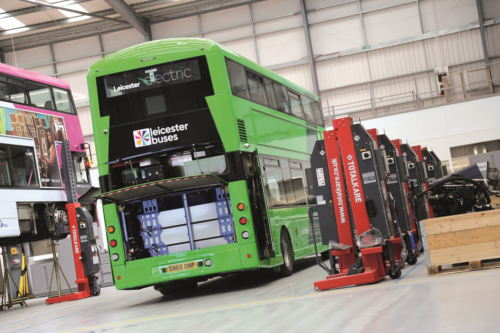
Jonathan Welch reports from the launch of Wrightbus’ new in-house bus repowering facility in Oxfordshire
Whether you like it or not, it’s coming. In the not too distant future, internal combustion engines, certainly of the diesel variety, will largely be a thing of the past when it comes to ordering new buses. But what about all those vehicles out there that have recently been delivered, or those still to be ordered, built and delivered between now and the end date for the sale of diesel vehicles?
Yes, they could go on as diesels, but as fleets become ever more electrified, and diesel fuel itself becomes more expensive to buy and use, what if there were an easy way to convert those existing, mid-life vehicles to use battery power?
A number of third-party converters have launched conversions over the last few years, but in a surprise move, Wrightbus has moved quickly to launch its own new bus re-engineering arm to cater for what it sees as a growing market (and given the short timescale of its inception it was almost as much of a surprise to Wrightbus as anyone else!).
In just nine months, the Northern Irish bus builder has gone from the seed of an idea, to having the first vehicles ready to leave the facility, which is located just a couple of miles from its AllServiceOne premises in Bicester. It has the capacity to turn out as many as 500 electrified mid-life buses per year, using Wrightbus’ own in-house designed replacement rear module, which contains batteries, motor and electronics.
The new business, NewPower, is a stand-alone venture that will work alongside existing Wrightbus brands, initially from its high-tech Oxfordshire base, though with scope for expansion in the UK and overseas. Wrightbus says that the cost of repowering an existing bus is substantially lower than buying new, and can be achieved in just three weeks. The Bicester facility can work on as many as six buses simultaneously, though at the time of the launch five were being worked on for initial customer First Bus, with the sixth bay occupied by removed components such as engines, gearboxes and fuel tanks, which will be returned to the operator for re-use.
[…]By subscribing you will benefit from:
- Operator & Supplier Profiles
- Face-to-Face Interviews
- Lastest News
- Test Drives and Reviews
- Legal Updates
- Route Focus
- Industry Insider Opinions
- Passenger Perspective
- Vehicle Launches
- and much more!


